SPOKANE, Wash. — Washington State University’s health sciences campus in Spokane is joining nonprofit Team Gleason and other partners to establish the Steve Gleason Institute for Neuroscience.
According to an article on WSU’s website, the institute will target innovative care and cures for brain disease. The institute will be located initially in a building at 325 E. Sprague Ave. owned by Avista and is expected to open in Spokane in the second half of 2019. The location is at the south end of the University District Gateway Bridge.
Community partners for the project include Avista, the Health Sciences & Services Authority of Spokane County (HSSA), Providence, St. Luke’s, MultiCare, the City of Spokane and the University District.
Gleason, who has ALS, is a Spokane native and former NFL star. His organization, Team Gleason, has made significant strides to provide ALS patients with technology that improves their lives.
In early January, President Donald Trump signed legislation awarding Gleason the Congressional Gold Medal. The Senate passed the legislation in June and the U.S. House of Representatives passed the bill on Dec. 20.
Daryll DeWald, chancellor of WSU Health Science Spokane, announced the project Tuesday.
The institute is expected to include a clinic research and care unit focusing on motor and cognitive therapy and supporting clinic trials of new medications or treatments; an assistive technology and smart home, which will use augmented and virtual reality, brain-machine interfaces and prosthetic devices; and a research unit.
“I’m honored that my alma mater, Washington State University, is committed to helping us further our mission of helping people live productively and purposefully, despite ALS or other diseases,” Gleason said in a statement. “I am also grateful that so many partners have come together to help achieve this comprehensive vision. It is my goal that the Institute will advance leading edge technology, while gaining valuable information that will help unravel the mysteries of ALS, and all brain diseases.”


